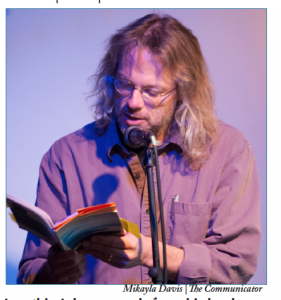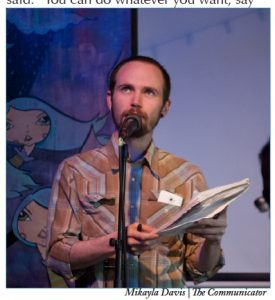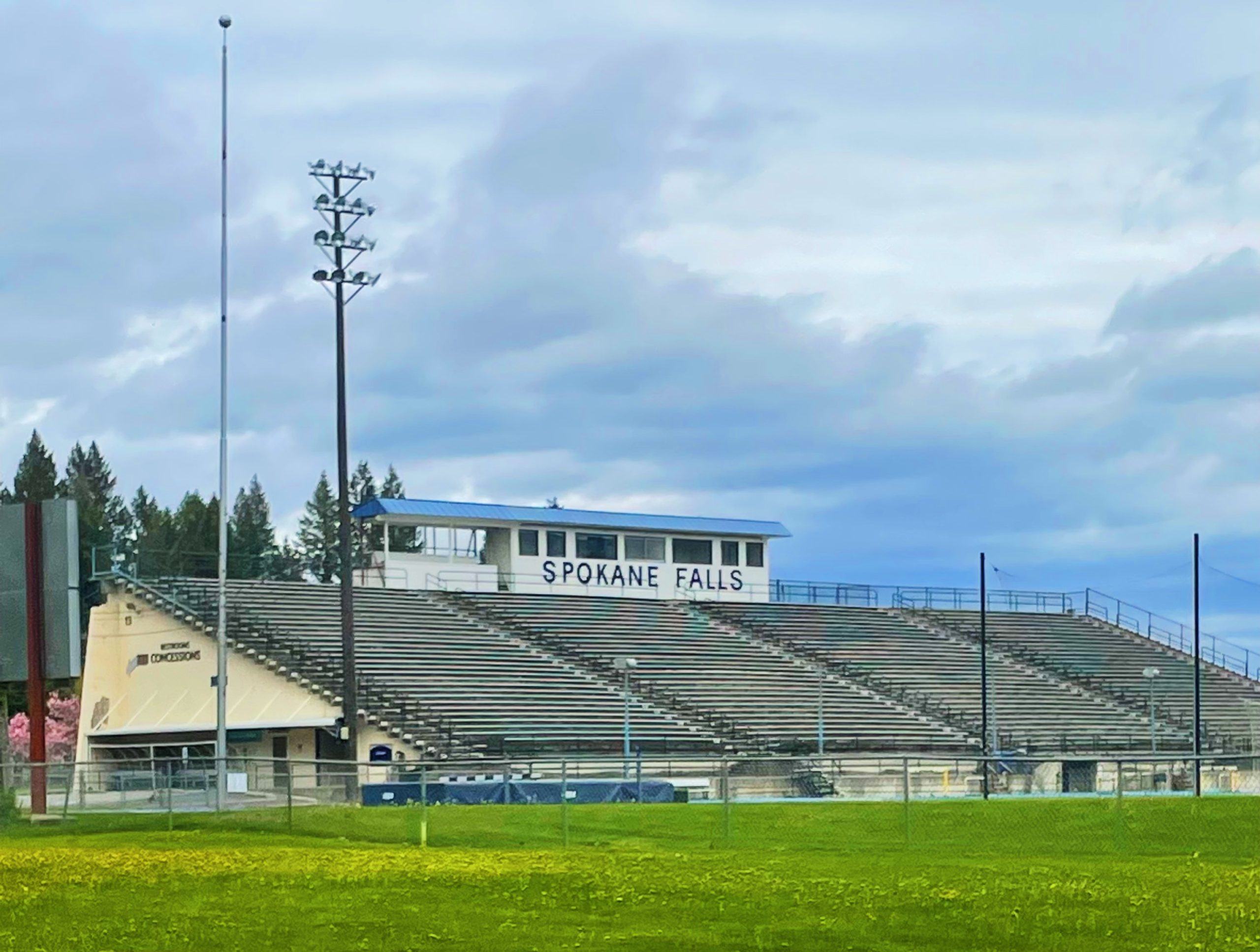Mikayla Davis
The Communicator
Every Wednesday a group of individuals
gathers together in the small space
at Neato Burrito in downtown Spokane.
Poetry, prose, and even songs are shared at
an event called Broken Mic. Many of these
readers are students at Spokane Falls Community
College.
“[Poetry’s] a place of truth and freedom,”
Rachel Goodner, one of those students,
said. “You can do whatever you want, say
what you want, be as harsh and as loving
as you want and say big things in a little
place.”
Started by Kurt Olsen and Mark Anderson,
Broken Mic has been around since
2008. “The reason Spokane is so great is
because there’s a community of listeners,”
Olsen, the current host, said.
hour before the event begins. By the time
people begin reading, it’s standing room
only.
According to Olsen, other cities only look According to Olsen, other cities only look
for the best poets so many people don’t get
the chance to show their skills.
“Spokane has never done that,” Olsen
said. “The poetry ranges. It’s all even. Nobody
is better than anyone else.”
Broken Mic also invites published poets
to their events. In just the last month they
have brought in Jade Sylvan and Robert
Lashley.
They also invited local guests such as
Jonathan Johnson, an instructor at Eastern
Washington University’s Inland Northwest
Center for Writers, and Laura Read, an English
instructor at SFCC.
“It was fun, but I was startled when they
clapped after every poem,” Read said. “I felt
like it was excessive praise, but I guess it’s
just customary at their readings.”
According to Olsen, that’s his favorite
part of Broken Mic. “More people are here
to listen than to read,” Olsen said.
There are always plenty of people reading.
This past week there were thirteen
people reading in the second half alone.
“It’s wonderful to see my students take
risks and get up there and share their work,”
Read said. “My students who have made
themselves do this have become more courageous
in class and in their writing.”
“It’s sort of like a trust fall: you get up on
stage and empty your heart and we will
always catch you,” Lauren Gilmore, a SFCC
student who regulars at Broken Mic, said.
However, Broken Mic is not the only
poetry event that Spokane hosts. Last year
Spokane was the host of the Individual
World Poetry Slam.
Poetry Slams do differ, though, from an
open mic event, like Broken Mic, because
they are scored.
“Poetry slams are a lot of fun and can be
quite nerve-wracking,” Gilmore said. “It’s
really valuable, though, because it gives you
instant feedback on your work.” According
to spokanepoetryslam.org, Gilmore is
ranked fourth in Spokane’s Poetry Slam.
“My favorite part is that the people judging
you may know absolutely nothing about
poetry and you get the chance to sort of
invent for them what poetry can mean and
how it can make them feel.” Gilmore said.
Spokane also holds an event every spring
called Get Lit! Get Lit! is a collaboration
of Spokane’s colleges and has a variety of
events from readings and poetry slams, to
workshops and panels.
“I love Get Lit!,” Read said. “We’re so
lucky to have such a big literary festival in
our medium-sized city. I remember when
we didn’t have it, and I think it has made
a huge differencdifference in our access to literary
culture.”
The event brings in guests such as Chitra
Divakaruni, Deborah Amos, and George
Bilgere. Other guests include faculty members
from the local colleges.
SFCC students can also encounter poetry
on campus through the Creative Writing club and The Wire Harp, the campus’s annual
creative arts magazine.
Students, faculty, and alumni of SFCC can
submit their poems, prose, and artwork to The
Wire Harp in the hopes of getting published.
“I think there is something to be said for the
accountability a writer takes on when they join
a scene,” Gilmore said. “If you know there are
people who want to listen to you, you will have
more incentive to speak. Writing communities
push their members to create.”
“I can’t believe how much our local poetry
scene is exploding right now,” Read, also a
faculty advisor of The Wire Harp with Connie
Scott, said. “I’m excited about it. I think people
are writing more poetry because they are inspired
by hearing so many different poems read
by all sorts of people at all sorts of venues and
seeing how democratic and accessible this
art form is.”



